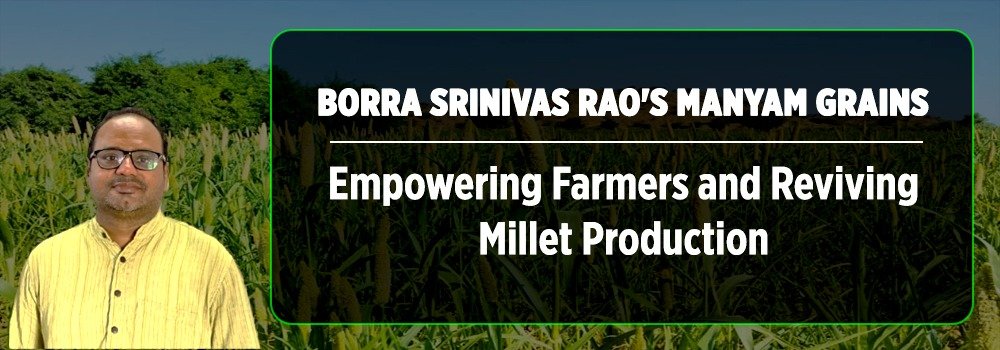
Borra Srinivas Rao, the founder of Manyam Grains, has successfully transformed the millet industry by sourcing grains directly from tribal farmers. Located near Visakhapatnam, Manyam’s processing plant handles and markets nine varieties of millets. The company’s efforts have resulted in a 30% increase in farmer incomes, liberating them from the grip of exploitative middlemen.
But why would a mechanical engineer choose to process millets? Srinivas, 38, explains, “After completing my engineering degree, I joined BHEL (Bharat Heavy Electricals Limited), but I found the work monotonous and stressful. A few friends suggested I pursue rural management, so I enrolled at XIMB (Xavier Institute of Management, Bhubaneswar). It was there that I became deeply moved by articles on the agrarian crisis, particularly the issue of farmer suicides.”
Millets are traditionally cultivated in the hilly tribal regions of Andhra Pradesh, Chhattisgarh, and Jharkhand, and Srinivas was drawn to the potential of improving these communities’ lives through sustainable agriculture. Manyam’s processing facility in Anakapalle, near Visakhapatnam, works closely with Farmer Producer Organizations (FPOs). By providing fair prices, training, and a reliable market, Manyam has helped increase the income of tribal farmers by 20-30%. In 2023-24, the company’s sales revenue surpassed Rs 1 crore.
Srinivas recalls, “Growing up, I had a romanticized view of farming. My understanding was shaped by the time I spent with my grandparents in the village, playing in the fields and with livestock. However, when I later learned about farmer suicides, I thought the solution might lie in organic farming.” But he quickly realized that organic farming wasn’t a feasible option for small-scale farmers due to its labor-intensive nature and lower yields. His professor suggested he look into millets — pest-resistant and low-maintenance crops that don’t require pesticides.
After gaining experience working with Earth 360, an organization focused on millet processing, Srinivas decided to launch Manyam Grains in 2018. “Millets are ideal for the hilly terrain where our farmers grow them. The quality of produce varies from farm to farm, making it difficult to deal with individual farmers. On average, a farmer sells about 300-400 kg of millet annually through an FPO. Last year, we purchased 200 tonnes of millets, impacting 400-500 tribal farmers,” he explains.
Millets are categorized into two types: naked millets (like ragi, bajra, and jowar), which don’t have a hard husk and can be consumed directly after harvesting, and husked millets, which require processing to remove the seed coat. Srinivas notes, “Millets lost popularity in our food culture due to the lack of proper processing technology. We address that by using a ‘non-polishing’ method, which retains the bran and preserves the nutritional value of the grain.”
Manyam processes all nine varieties of millet, increasing the diversity of millets in the region. The company also provides training to farmers, charging a nominal fee for their services. “Our training extends to FPO leaders and government officials as well. We’ve supported the Odisha Millet Mission, written manuals on processing, and conducted training programs for farmers in that state. We're also working to influence policy in favor of millet production,” says Srinivas.
Through his work, Srinivas has not only revived interest in millets but also created a sustainable model that benefits farmers and promotes healthier, nutritious food.
© 2023 - 2026 Millets News. All rights reserved.